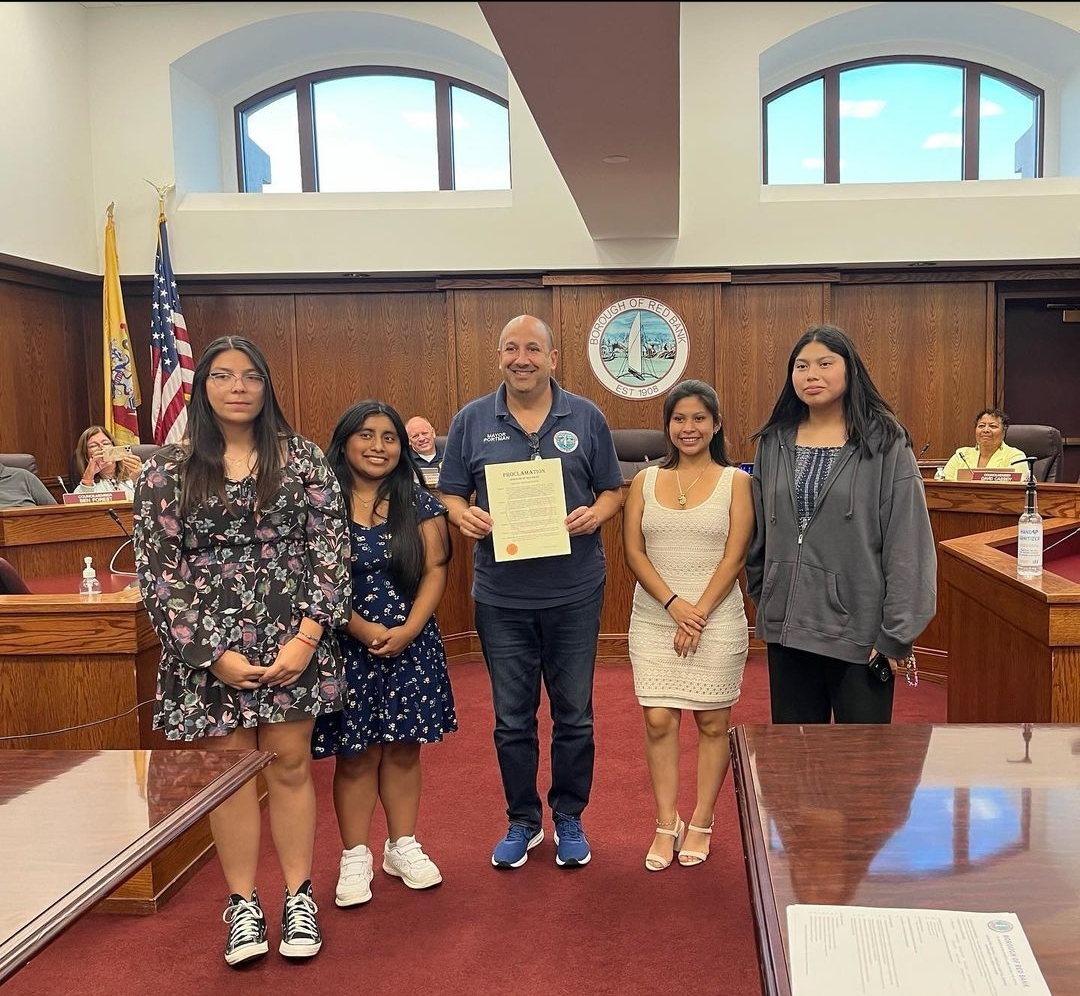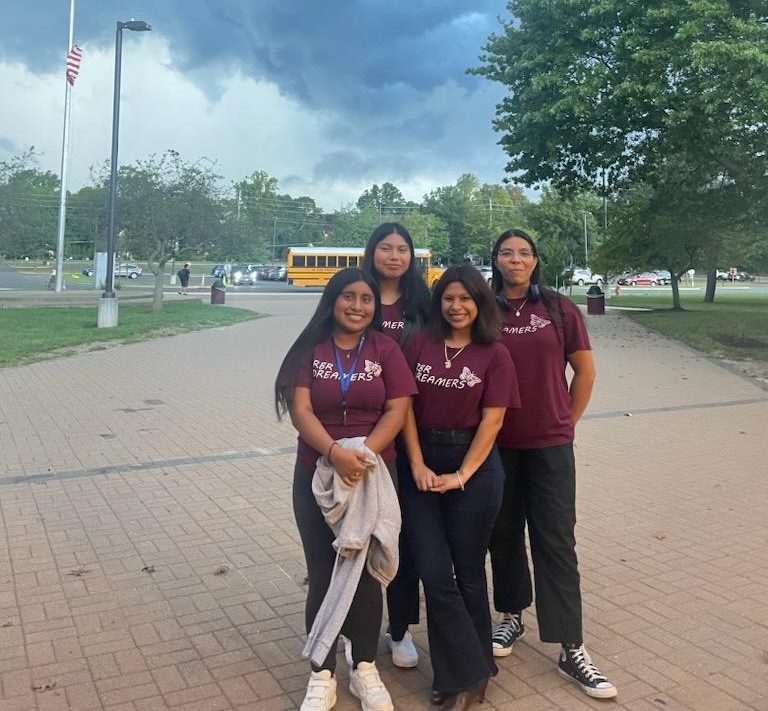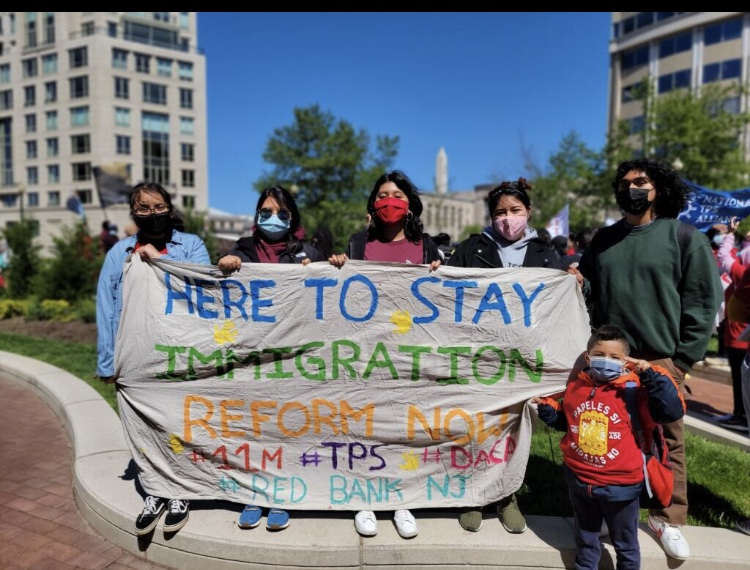
RBR Dreamers executive committee receive the Hispanic Heritage Month resolution from the Red Bank government. From left to right: Secretary Madelyn Sanchez-Berra, Treasurer Selena Martinez-Santiago, Red Bank Mayor Billy Portman, President Edith Lozano Zane, and Vice President Bethzy Vera Varela.
At Red Bank Regional High School in New Jersey, the RBR Dreamers Club serves as a safe, welcoming space for immigrant and first-generation students. The high school is predominately white but has a growing number of students of color, particularly from immigrant families. As part of the RBR Dreamers club, students connect with others who know firsthand the challenges they face in and outside of school. They discuss ways to confront problems in their everyday lives. And they advocate for immigrant-friendly policies in New Jersey and across the U.S.
Over the years, RBR Dreamers has grown to be the largest club on campus, with 35 members. It also has the most students of color.
“Our club provides space for those who feel ‘othered’—those who feel like they will never fit into RBR no matter what they do,” said Madelyn Sanchez-Berra, the club’s secretary. “Our club lets them know they are allowed to take up space, to share their thoughts and ideas with others, and that they belong in a community.”
Members of RBR Dreamers also support their school community. They provide free translation services at school events, help students navigate college applications, and more. Several club members have helped organize and advocate for access to driver’s licenses and state financial aid for undocumented students as well as other policies that promote the rights of all immigrants. As an immigrant rights organizer for AFSC, I’ve worked closely with them on these efforts.
Despite the club’s importance to so many, its existence has never been guaranteed. It took the group five years to be recognized as an official school club in 2021. In the two years since then, students have had to testify twice in front of the Board of Education as questions regarding their club recognition have surfaced.
The fear of ceasing to exist as a club came to a head this August, just days before the start of the new school year. During a board meeting in which only five of nine board members were present, a single board member voted against funding the club. That led to the RBR Dreamers losing their status as an official school club. Soon after, the club was removed from the school's website.
Madelyn Sanchez-Berra"Our club provides space for those who feel ‘othered’—those who feel like they will never fit in."
The Dreamers were shocked. They should have been enjoying the start of a new year at school. Instead, they were faced with the prospect of losing one of the few spaces where they knew they belonged.
But they refused to back down. The club’s executive committee courageously decided to create a campaign to oppose the shutdown and restore their club.
Building a grassroots campaign
In less than 96 hours, the executive committee—known as the “Dream 4”—did everything they could to prepare for a special board meeting on their club’s status. They filed a discrimination complaint against the board with the New Jersey Division of Civil Rights.
The complaint read:
“The Dreamers Club has been subjected to discriminatory treatment from the Board of Education members and has been threatened with losing its club status. The club has been continually singled out by the Board for reasons that can only be explained based on political ideology and the national origin/protected characteristics of the Dreamer[s] Club and the population on behalf of which it advocates.”
Club President Edith Lozano Zane said, “The mantra we are taught in school is, ‘Grow up to be the person you needed when you were younger.’ Unfortunately, our school has forced us to grow up now.”
Selena Martinez-Santiago, Dreamers club treasurer, added: “Our club has been singled out for nine years. We are ready to take a stand against discriminatory actions that have instilled fear in our club members, hurting our members, and protecting those in higher power over the best interests of students.”
After filing the complaint, the Dream 4 mobilized 100 people from the community to show up at the board meeting. They gathered 250 petition signatures in support of their club. They compelled the Board to move the meeting to the cafeteria to accommodate the crowd size and got the local newspaper to livestream the meeting so people at home could follow along for the vote. The Dream 4’s efforts also picked up support from Red Bank’s Mayor and the entire governing body. They all showed up to the meeting.

The Dream 4 outside of the school board meeting where board members voted to restore their club's status.
At the meeting, the Dream 4 and others testified about what the club meant to them. Bethzy Vera Varela, the club’s vice president, talked about how she had once been ashamed of her heritage—and it took a toll on her.
“It wasn’t until I joined the Dreamers Club that I finally became proud of my heritage, when I should have been proud all along,” she said. “My parents did not walk hundreds of miles, come all the way across the country, get treated the way they did, nor did my dad work two jobs, for me to be ashamed of where I came from.”
Nearly every person in the room—including the deputy mayor, the club’s former president, community leaders, and all but the lone Board member—expressed their support for the Dreamers. The school superintendent, Lou Moore, recognized that the Dreamers’ concerns “uncovered some deeper issues that we cannot walk away from. We need to make it clear to ourselves, to our students, and to our community that the status quo is no longer acceptable.” He also committed to forming a committee of staff, students, and community members to address issues of discrimination and inequity in Red Bank Regional High School.
In a 6-1 vote, the board voted to restore the club’s funding and status—reversing its previous decision. The Dreamers had saved their club. They also reminded every one of us of the power of people coming together to resist in the face of injustice.
Today, the Dreamers’ work isn’t done. For them, this campaign was just the start. They want to play a lead role in addressing the inequity and discrimination many students with immigrant parents face as they navigate educational institutions in New Jersey and beyond. They see plenty of things that need to be fixed. This victory is an opportunity to have larger conversations as a community and envision what equitable education really means.
It’s been an honor to support these young leaders in their efforts. As someone with the privilege of having a front-row seat, I can tell you the world is not ready for their level of fearlessness, righteousness, and commitment to ensure a better future for us all.
